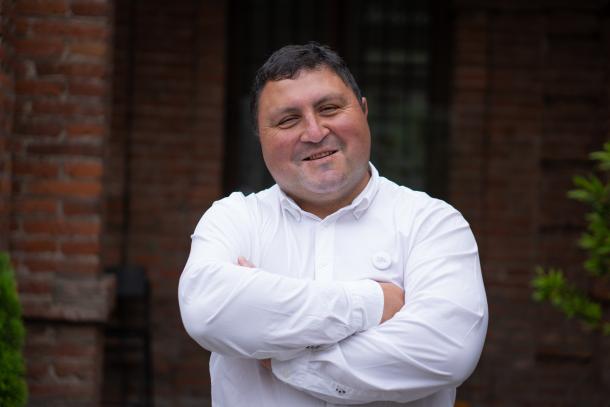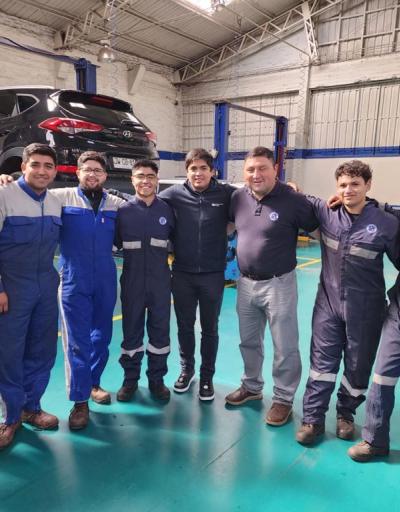The Global Teacher Prize (GTP) in Chile is an award that recognizes teaching excellence and is supported by UNESCO and organized by the NGO Elige Educar. Its national objective is to highlight and promote the role of teachers and educators as professionals contributing to the development of their students, educational communities, and the country. In 2023, the award was given for the first time to a teacher in professional technical education.
Marcelo Cofré (45) is an Automotive Mechanics teacher at the Liceo Técnico Profesional Pueblo Nuevo in the city of Temuco, in the Araucanía Region (Chile). Marcelo was recognized for his close relationship with students and his ability to use automotive mechanics to strengthen the link between the school where he teaches and its community.

Marcelo was born in Argentina and moved to Cunco, a small town 60 kilometers from Temuco, in the Araucanía Region, Chile, when he was just three years old. He completed his basic education at the Hermano Leovigildo Kley School in the same locality. He fondly remembers his teachers. “They made me want to continue studying, to leave the town and seek new horizons,” he says.
He had a simple childhood. He built his own toys from wood: “Having limited resources and being far from big cities made me develop manual skills that serve me to this day,” he claims. Later, at 14, he moved alone to Temuco, under the care of an older brother, to study at the Liceo Politécnico Pueblo Nuevo, where he is now a teacher.
When he moved to Temuco to study, his parents supported him financially as much as they could, but he and his brother had to take care of many household tasks. “It was complicated at first,” he recalls. Marcelo is thankful for his parents' guidance and the clarity with which they spoke to them. Thanks to their support, “we took the opportunity to study, obtain professional degrees, and be happy,” he says.
Why did you decide to become a teacher?
Since I was young, I have experienced education in a very affectionate way, receiving not only knowledge from my teachers but also advice, hugs, motivation, concern, and without a doubt, I am convinced that this marked my way of living and acting in society. I entered the Liceo Politécnico Pueblo Nuevo and being alone in a new city, the support I received from the institution was fundamental.
Once I graduated from higher education and was working in an automotive company, where I undoubtedly had a good career projection, I observed the behavior of a student intern from the school where I graduated. When he finished his internship, he was very grateful for the learning experiences, gave me a strong hug, and said very kind words about my role as his mentor in the workshop. This experience prompted me to rethink my life, dedicate myself to education, and use my technical knowledge to create opportunities for the youth in my city.
What are the biggest challenges you have faced as an educator?
The first challenge was to guide all my technical knowledge from my training as an engineer in Machinery and Automotive Vehicles and the skills acquired in my development as a technician in different automotive companies, and to put them at the service of the development of my classes and ensure that my students constructed meaningful learning. What I knew was for me, and I had to learn how to transmit it.
The biggest challenge I face year after year is to discover the interests and needs of my students to contextualize my classes, create integrative spaces in a framework of diversity, leading them to be the main actors of their learning, both technically and in social awareness.
What do you think should be improved in Chilean education?
It's important to contextualize content according to the needs of students, and we have to work on this from the foundations of teacher training. It is essential that in professional technical high schools there is curricular integration between the general education area and the modules of the specialties, giving more relevance to what students learn. It is necessary to enhance community work so that families and schools can favor communication and the comprehensive development of the student.
How do you feel about winning the Global Teacher Prize?
These are unique moments of happiness and joy, where I have been able to receive recognition from an entire community, management team, friends, fellow teachers, education assistants, guardians, my student children, and former students. This delights my heart, thinking that in these 17 years of teaching work I have been able to positively impact many generations of students and their families.
It has also become a challenge, considering that my personal experience in education can serve as an example or inspiration for more teachers and that I have the great responsibility of being part of the Advisory Council for Technical Professional Education for the Ministry of Education, where I seek to contribute from a very practical perspective of what Technical-Professional Secondary Education (TPSE) is.
What would you highlight the most from your career as a teacher?
What I highlight in my teaching career is opening doors and providing growth opportunities to all the students I have in the classroom, all in a socio-emotional context and understanding of the person I have in front of me. I am convinced that educating with affection allows for the delivery of content and skills that favor the professional and personal development of my students
In your opinion, what has helped you the most in being a good teacher?
I believe the key is never to forget that I was a student and that I made the same mistakes as my kids, that their needs are not so different from what I had at their age. All this helps me better understand their actions and helps in the contextualization of classes to work based on their interests, providing all the guidance and support necessary to generate in them a social consciousness that allows forming not only technicians but integral people and true agents of change.
What do you think is the importance of recognizing a technical education teacher with this award?
With this recognition, I hope that paradigms regarding technical professional education can be broken, allowing us to visualize the world of opportunities it offers, both for labor insertion and for continuing studies in higher education, developing entrepreneurship, among others.
How does technical education contribute to Chile?
TPSE is contextualized to economic needs, allowing it to satisfy the demand for technicians as an important workforce in the different areas that move the country's economy. In this sense, public policies have contributed to the articulation between TPSE, Higher Education (technical training centers, professional institutes, and universities), and companies, to promote the academic trajectory of technical professional students and their labor insertion.
Moreover, it is undoubtedly the gateway to the development of our students' life projects. In this line, an TPSE graduate has the possibility of contributing to the family sustenance. For companies, they are technicians in training who, through professional trajectories, can be trained and become qualified technicians, contributing to the development of companies and thus to the region and the country. In higher education, TPSE graduates already have solid foundations in terms of knowledge and skills, which favors their learning, enhances classroom dynamics, and reduces student dropout.
What advice would you give to other educators to support the development of their students?
My advice is that teachers always focus on our students. To generate learning, we must first connect with them, listen to them, and attend to their needs, within our possibilities. It is essential to achieve a degree of closeness of the students with their teacher and school so that they feel supported and confident that we want the best for them.
[We must] take advantage of all interaction opportunities, link the family with our pedagogical work, and generate learning dynamics considering their demands.









